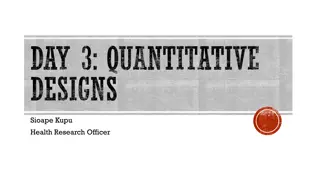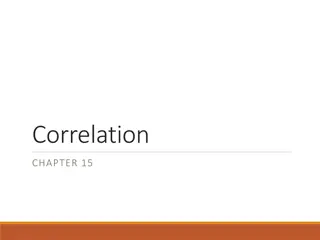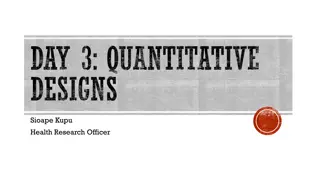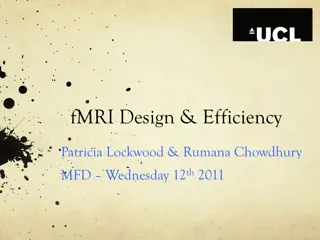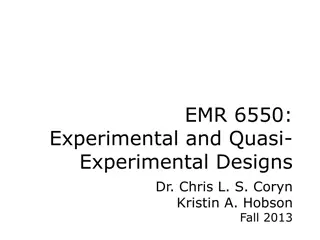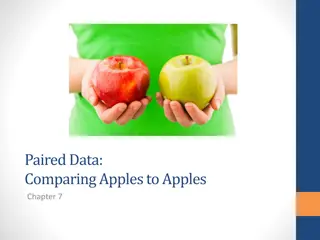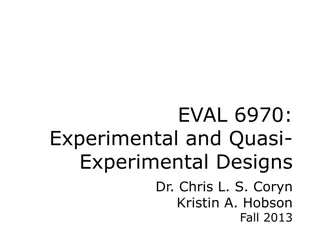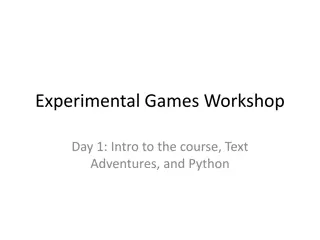Introduction to Experimental Economics by John Hey: A Comprehensive Overview
Explore the interconnected realms of Experimental Economics and Behavioral Economics through the insightful lectures of John Hey, an Emeritus Professor at the University of York. Discover the methodology of testing economic theories for validity and the practical applications of experimental economi
11 views • 58 slides
Quantitative Research Designs in Health Research
Quantitative research designs play a crucial role in health research, offering various methodologies like experimental and observational designs. Observational designs are commonly used and can establish associations but not causality. Longitudinal designs track outcomes over time, providing valuabl
6 views • 25 slides
Nonexperimental and Quasi-experimental Studies
Nonexperimental and quasi-experimental studies resemble experiments but lack random assignment, making them valuable for group comparisons without establishing causation. This type of research design looks at differences between groups that already exist, focusing on group differences rather than ca
6 views • 35 slides
Multiple Baseline Designs in Behavioral Experiments
Multiple Baseline Designs are a type of experimental design used in behavioral research. This design involves measuring two or more behaviors concurrently in a baseline condition, applying a treatment variable to one behavior at a time while maintaining baseline conditions for others, and then seque
5 views • 34 slides
Experimental Psychology: Designs and Control Issues in Research
This content delves into the basics of experimental research, focusing on different types of experimental designs and control issues. It covers between-group and within-group designs, discussing advantages and disadvantages, as well as methods for controlling for nonequivalence. The importance of ra
4 views • 26 slides
Clinical Trials: Types and Designs
Clinical trials are essential research studies that evaluate new tests and treatments to improve human health outcomes. They involve various phases, designs, and purposes, such as treatment trials, prevention trials, and observational studies. Different types of clinical trial designs include experi
26 views • 18 slides
Correlation in Research Designs
Research designs like experimental, quasi-experimental, and correlational serve different purposes in studying variable relationships. Correlation does not imply causation and can be positive or negative, indicating how two variables change together. The correlation coefficient quantifies this relat
8 views • 43 slides
Quantitative Designs in Health Research
Explore different types of quantitative research designs including observational, longitudinal, and case-control studies. Learn how these designs are used to establish associations, measure outcomes over time, and compare groups. Discover the advantages and disadvantages of longitudinal designs in c
5 views • 25 slides
Efficient fMRI Experimental Design: Maximizing Neurovascular Response
Understanding the importance of correctly designing fMRI experiments is crucial for testing specific hypotheses by manipulating stimulus types, timing, and participant instructions. Types of experimental designs include categorical, factorial, and parametric designs, each serving different purposes
0 views • 35 slides
Quantitative Research Designs in Nursing
Delve into the world of quantitative research in nursing, exploring different research designs and the concept of causality. Learn about experimental, quasi-experimental, and non-experimental designs, as well as the characteristics of experimental design like manipulation, control, and randomization
3 views • 22 slides
Quasi-Experimental and Interrupted Time-Series Designs Overview
Explore the various quasi-experimental designs, control groups, pretests, and outcome patterns in research methodologies. Understand the implications of different outcome patterns on causal interpretation and validity threats in experimental studies.
4 views • 31 slides
Fractional Factorials in Experimental Designs
Explore the concept of fractional factorials in experimental designs, including the basics, factors, terms estimation, confounding, and practical considerations for running treatment combinations. Learn how to generate incomplete blocks, use orthogonal contrasts, identify confounded terms, and alloc
3 views • 24 slides
Special Topics in Design: Factorial Experiments and Fractional Designs
This content delves into the world of factorial designs used in design experiments to identify important factors and interactions. It explores 2k full factorial designs and their application in screening potential factors. Additionally, the content discusses 2k-p fractional factorial designs and the
2 views • 19 slides
Paired Data Analysis in Research Studies
This content discusses the significance of paired data, its role in reducing variability, and examples of experimental designs used in research studies. Explore comparisons between Meijer and Family Fare prices, and testing The Freshmen 15 theory. Discover how different music types affect studying a
5 views • 55 slides
Experimental and Quasi-Experimental Designs
Explore the foundations of experimental and quasi-experimental designs, delving into causal relationships, counterfactual reasoning, and the importance of validating statistical and internal conclusions. Learn about causes, effects, and the complexity of determining causation in research. Discover R
8 views • 46 slides
Experimental Studies in Epidemiology
Epidemiological studies and experimental studies play vital roles in understanding cause-and-effect relationships in research. Experimental studies involve manipulating independent variables and measuring dependent variables, with categories such as true experimental, quasi-experimental, and pre-exp
4 views • 22 slides
Paired-Samples Designs in Research
Paired-samples designs are valuable in research when the assumption of independence is violated, leading to dependency across groups. These designs involve comparing means of two related groups with smaller variance in the dependent variable. Repeated-measures designs offer a framework for successiv
3 views • 20 slides
Nested Designs and Repeated Measures with Treatment and Time Effects
Factors in nested designs involve levels within different levels of another factor. Understanding nesting factors can help in analyzing complex experimental setups efficiently. This model explores the balanced case of a 2-factor nested design, discussing fixed and random factors and their effects on
2 views • 20 slides
Experimental Games Workshop: Intro to Text Adventures & Python
Welcome to the Experimental Games Workshop Day 1! Join us for an introductory course exploring Python for text adventure games and other exciting topics like game design, microcontrollers, and more. Collaborate with peers, engage in teamwork, and dive into experimental game development. Get ready fo
1 views • 19 slides
Experimental and Intervention Studies: Understanding Study Designs
In this informative content, you will explore experimental and intervention studies led by Dr. Rashmi Katyal. Learn about study methodologies, the value of experimental studies, types of intervention studies, and the hierarchy of evidence. Discover the significance of experimental study designs and
4 views • 52 slides
Introduction to Experimental Studies in Clinical Trials
Clinical trials play a crucial role in advancing medical research by evaluating experimental treatments through various study designs. This introduction explores the definition of clinical trials, the importance of experimental studies, different types of experiments, principles of experimental desi
17 views • 63 slides
Policy Innovation Through Experimental Approaches
This content discusses modes of experimental policy engagement, policy design experiments, creating experimental spaces, supporting and evaluating experiments, experimental governance, and the role of experimentation in policy formulation. It also explores methods and approaches used in TIPC member
5 views • 15 slides
Experimental and Quasi-Experimental Designs Overview
In this course material, delve into statistical power, design sensitivity, types of hypotheses, accept-reject dichotomy, type I and type II errors, determinants of power, and more. Explore the crucial factors influencing research design outcomes and decision-making processes. Gain insights into how
0 views • 27 slides
Overview of Study Designs
This presentation by Janet Aucoin, based on the work of Dr. Brent Hagel, introduces major epidemiologic study designs. It aims to distinguish among these designs, emphasizing their characteristics and critical appraisal aspects. The study of designs is vital for mitigating bias and understanding res
1 views • 33 slides
Statistical Analysis of Data in Experimental Physics
Explore the fundamental principles of statistical analysis in experimental physics, covering topics such as measurement, model, random variables, sampling, errors, and regression analysis. Understand the importance of uncertainties, significant figures, and systematic errors in experimental data int
2 views • 34 slides
Different Types of Experimental Designs
Explore various experimental designs such as basic experiments, posttest-only design, pretest-posttest design, Solomon four-group design, and independent vs. repeated measures designs. Learn about the advantages, disadvantages, and potential confounding variables in independent groups design.
1 views • 19 slides
Characteristics of Experimental Studies: Manipulation, Control, Randomization
Understand the key elements of experimental studies, including manipulation, control, and randomization. Experimental designs are recognized as the gold standard for inferring causal relationships, making them crucial in research. Identifying if a study is experimental involves looking for specific
3 views • 34 slides
Experimental and Quasi-Experimental Designs Overview
Explore the concepts of experimental and quasi-experimental designs, including basic elements, measurement techniques, comparison groups, treatments, and notation. Learn about the limitations of designs lacking control groups or pretest observations, simple strategies for improvement, and why such d
3 views • 34 slides
Experimental Design Terms: CRD, Experimental Unit, Replicate, and Block
Explore the meanings of experimental design terms like CRD, experimental unit, replicate, and block. Learn how these terms are essential in statistical analysis and experimental research.
3 views • 12 slides
Experimental and Observational Study Design
Explore the fundamentals of experimental and observational studies, including the distinction between units in experimental and observational studies, factors, treatments, and randomization processes. Learn about completely randomized and blocked designs, as well as standard experimental design appr
2 views • 8 slides
Methods in Clinical Cancer Research: Observational Studies and Experimental Designs
Explore the methods used in clinical cancer research, including observational studies like prospective cohort and case-control studies, as well as experimental designs focusing on controlled exposure and treatment variables. Understand the differences between observational and experimental approache
4 views • 58 slides
Educational Experimental Research Designs: Key Concepts & Steps
Explore the essence of educational experimental research designs as presented by Luvsandorj Ts in MNUE. Learn about experiments, research designs, steps in conducting experimental research, and more. Delve into the world of hypothesis testing, group comparisons, ANOVA, and statistical significance i
10 views • 7 slides
Comparison of Designs in Experimental Research
Explore the differences between fixed vs. random effects, as well as cross vs. nested designs in experimental research. Understand when to use each design type and their implications for data analysis and inference.
0 views • 4 slides
Managing Experimental Data in Computational Physiology Using OpenEHR
Learn how the openEHR standard is leveraged to manage experimental data in computational physiology, facilitating flexible and model-driven handling of data and metadata. Explore the integration of standards such as MIASE/MIBBI and COMBINE for simulation experiments and the challenges faced in align
4 views • 24 slides
Research Methods and Experimental Studies Definitions
Explore essential research methods and experimental study definitions, including concepts like alternate hypothesis, blind study, control group, data collection, double-blind study, experimental study, experimental unit, fact, opinion, and null hypothesis. Enhance your understanding of these terms t
1 views • 27 slides
Understanding Nested Designs in Experimental Studies
Explore the concept of nested designs in experimental research, which involve unique levels of factors nested within each other. Learn about the model, decomposition of sum of squares, and expected mean squares for factor effects.
2 views • 18 slides
Understanding Experimental Designs and T-Tests in Research
Explore complex experimental designs, assumptions of T-tests, and the impact of increasing the number of levels or variables in research studies. Learn about factorial designs and their implications in experimental setups.
1 views • 55 slides
Understanding Experimental and Quasi-Experimental Designs
Explore different experimental and quasi-experimental designs such as interrupted time-series, control groups with pretests, and outcome patterns. Learn about the implications, challenges, and interpretations in research methodologies.
1 views • 31 slides
Experimental Methods in Leisure and Tourism Research
Explore the use of experimental methods in leisure and tourism research, covering principles, classic experiments, validity factors, threats to validity, and quasi-experimental designs. Gain insights into how to conduct effective experimental research in the field. An informative guide for researche
0 views • 12 slides
Experimental Insights in Social Sciences
Gain valuable insights into the world of social sciences through experimental mechanisms and policy evaluations. Explore the evolving field of experimental action-oriented studies and the quest for policy-relevant information within a budget. Delve into the applications of experimental design, the d
1 views • 28 slides

